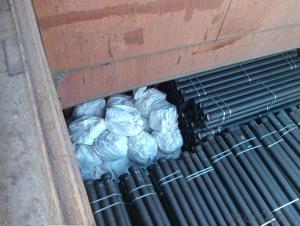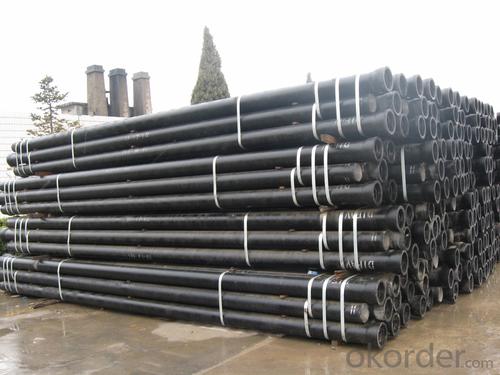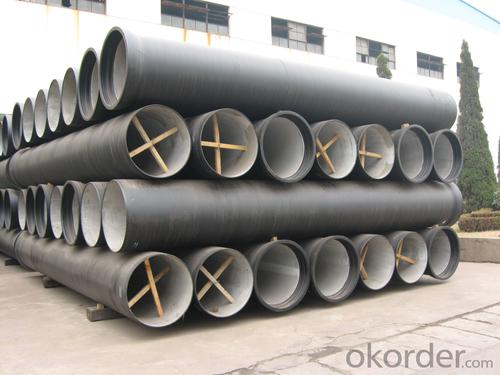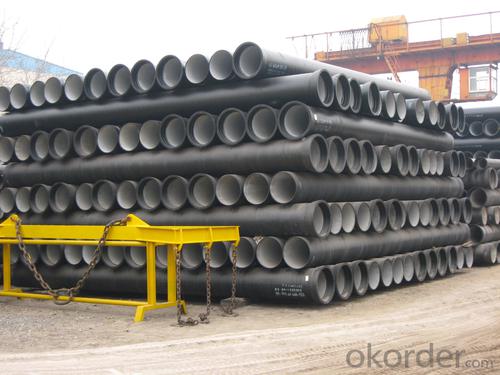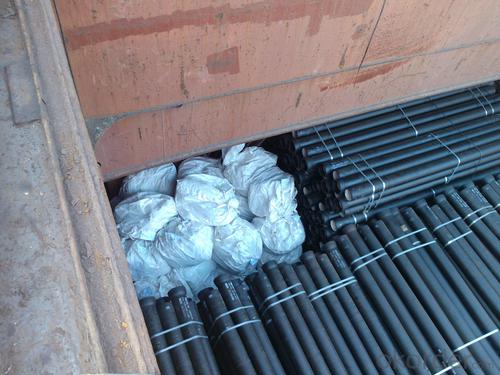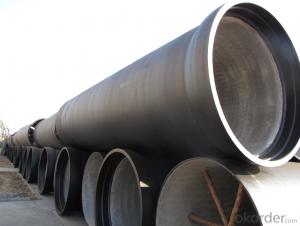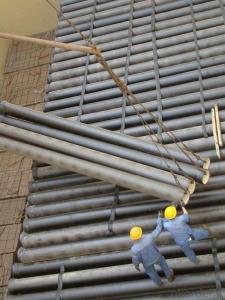DUCTILE IRON PIPE DN250 K8/C/K9
- Loading Port:
- China Main Port
- Payment Terms:
- TT or LC
- Min Order Qty:
- 20 m.t.
- Supply Capability:
- -
OKorder Service Pledge
OKorder Financial Service
You Might Also Like
Specification:
1) The standard of pipe: ISO2531:1998, K9
2) Effective length: 6m
3) Inner cement line: Portland cement line as per ISO4179
4) Zinc coating: at least 130g/m2 as per ISO8179
5) Bitumen painting: at least 70um as per ISO8179
6) With 100% quantity of NBR ring, or SBR ring, or EPDM ring as per ISO4633
7) DN80mm-800mm
8) High strength, lighter than grey iron, good corrosion resistance, no furring, small flow resistance, easy fixing, long life tome about 100 yeas
9) Produced by Hangzhou chunfeng machine
10) Checked by automatic inspection equipment
11) Composition:
Chemical composition | ||||||
Chemical composition | Ductile Cast Iron Pipe (%) | Grey iron pipe (%) | Steel pipe (%) | |||
C | 3.5-4.0 | 3.2-3.8 | 0.1-0.2 | |||
Si | 1.9-2.6 | 1.4-2.2 | 0.15-0.4 | |||
Mn | 0.15-0.45 | 0.4-0.6 | 0.3-0.6 | |||
P | ≤0.06 | ≤0.3 | 0.02-0.03 | |||
S | ≤0.02 | ≤0.1 | 0.02-0.03 | |||
Mg | 0.03-0.06 | |||||
12) Feature:
Mechanical properties | ||||||
Ductile Cast Iron Pipe | Grey Iron Pipe | Steel Pipe | ||||
Tensile Strength(Mpa) | ≥420 | 150-260 | ≥400 | |||
Yield Strength(Mpa) | ≥300 | No Confirmation | No Confirmation | |||
Bending Strength(Mpa) | ≥590 | 200-360 | ≥400 | |||
Elongation (%) | ≥10 | Neglected | ≥18 | |||
Brinell Hardness(HBS) | ≤230 | ≤230 | About 140 | |||
13) T type mechanical joint
14) Packing: in bulk or container
Our main material are all carbon steel and alloy steel ,such as :aisi1020 1035 1045 1055 s20c s35c s45c s55c ss400 a36 c20 c35 c45 ck45 aisi4140/scm440 aisi4340/40crnimoa aisi8620H,40cr,gcr15,sae52100,20Mn,40Mn,St52,St37,S235JR,etc
- Q: What are the different types of ductile iron pipe joints?
- There are several types of ductile iron pipe joints, including push-on joints, mechanical joints, restrained joints, flanged joints, and grooved joints.
- Q: How does ductile iron pipe handle soil movements and settlements?
- Ductile iron pipe has gained a reputation for effectively managing soil movements and settlements. Its ability to accommodate ground shifts and settling without compromising its structural integrity is attributed to its flexibility and durability. A notable characteristic of ductile iron pipe lies in its inherent strength and resilience. It can endure external pressures and stress caused by soil movements, including lateral forces and ground settlement. This is due to its high tensile strength, which enables it to resist deformation and maintain its shape even under substantial loads. Furthermore, the flexibility of ductile iron pipe plays a crucial role in its capacity to handle soil movements. The pipe's natural flexibility allows it to absorb the impacts of ground shifts and movements without fracturing or breaking. It can bend and adjust to changes in the surrounding soil, minimizing the risk of pipe failure or leakage. Additionally, the joint design of ductile iron pipe contributes to its effectiveness in managing soil movements and settlements. The installation employs a push-on joint system that permits some movement and settlement without compromising the overall integrity of the pipeline. The joints can absorb and distribute stress and movement, minimizing the risk of pipe failure. In conclusion, ductile iron pipe excels in managing soil movements and settlements. Its strength, flexibility, and joint design enable it to withstand external pressures resulting from ground shifts, settling, and other soil movements. As a result, ductile iron pipe is a reliable choice for a range of applications where soil movement is a concern.
- Q: Are ductile iron pipes suitable for irrigation systems in agricultural fields?
- Yes, ductile iron pipes are suitable for irrigation systems in agricultural fields. Ductile iron pipes have excellent strength, durability, and corrosion resistance, making them ideal for carrying water in irrigation systems. They can withstand high pressure and heavy loads, ensuring reliable water supply to agricultural fields for irrigation purposes.
- Q: How are ductile iron pipes repaired in case of damage?
- Ductile iron pipes are typically repaired through various methods such as spot repair, joint repair, or full replacement. Spot repair involves fixing small sections of the pipe by cutting out the damaged area and replacing it with a new piece. Joint repair focuses on repairing the joints between pipe sections by replacing gaskets or applying sealants. In cases of extensive damage, full pipe replacement may be necessary to ensure the integrity and longevity of the pipeline system.
- Q: Are ductile iron pipes suitable for use in industrial applications?
- Yes, ductile iron pipes are suitable for use in industrial applications. Ductile iron pipes are known for their high strength and durability, making them ideal for handling the demands of industrial environments. They are resistant to corrosion and can withstand high pressures and temperatures. Additionally, ductile iron pipes have excellent impact resistance, making them suitable for use in areas with heavy traffic or potential for mechanical damage. Their flexibility allows them to absorb vibrations and shocks, further enhancing their suitability for industrial applications. Overall, ductile iron pipes are a reliable and cost-effective choice for various industrial sectors such as water and wastewater treatment, mining, power generation, and chemical plants.
- Q: How does ductile iron pipe perform in corrosive environments?
- The exceptional performance of ductile iron pipe in corrosive environments is widely recognized. Its resistance to corrosion has been thoroughly demonstrated, thanks to its distinctive composition and protective coatings. The presence of graphite nodules is the primary factor contributing to this resistance. These nodules serve as a barrier against corrosive agents, effectively inhibiting the spread of corrosion and providing a protective layer for the iron pipe. Furthermore, ductile iron pipes often undergo various external coatings and linings to further enhance their corrosion resistance. Coatings such as cement mortar lining or epoxy coatings are applied to create an additional protective layer. These coatings act as a barrier between the pipe and the surrounding environment, preventing corrosive substances from reaching the iron surface. In addition, ductile iron pipes are highly durable, which greatly enhances their performance in corrosive environments. They have a long life expectancy and can withstand high-pressure conditions, making them suitable for a wide range of applications. The inherent strength of ductile iron makes it less susceptible to damage, even in harsh environments. It is important to note that while ductile iron pipes exhibit excellent resistance to corrosion, the specific performance may vary depending on the nature and concentration of the corrosive substances present. In extremely aggressive environments, additional protective measures such as cathodic protection or sacrificial anodes may be necessary to ensure long-term durability. Overall, ductile iron pipe has a proven record of outstanding performance in corrosive environments. Its unique composition, combined with external coatings and linings, make it a dependable choice for applications where corrosion resistance is crucial.
- Q: What is the expected deflection limit of ductile iron pipes?
- The expected deflection limit of ductile iron pipes is typically around 2% of the pipe's diameter, as per industry standards.
- Q: What is the external coating used in ductile iron pipes?
- Ductile iron pipes usually have an external coating made of protective materials like zinc or asphalt. These coatings are applied to the pipe's surface to prevent corrosion and shield the iron from its surroundings. Zinc coatings, like hot-dip galvanizing, are widely employed because of their exceptional resistance to corrosion. Conversely, asphalt coatings offer a resilient and adaptable shield against corrosion and abrasion. The selection of the coating relies on factors such as the intended use, environmental circumstances, and project-specific requirements.
- Q: How do ductile iron pipes perform in high-velocity water flow conditions?
- Ductile iron pipes perform excellently in high-velocity water flow conditions. Their inherent strength and durability allow them to withstand the force and turbulence of fast-flowing water without any significant issues. These pipes have been extensively tested and proven to maintain structural integrity, resist erosion, and minimize the risk of leaks or bursts, making them a reliable choice for high-velocity water flow applications.
- Q: How can the ductile iron pipe be welded?
- Welding cast iron is mainly in three aspects: carbon control, stress elimination, structural adjustment. You can choose better welding materials, such as WE777 and other imported welding materials. Crack resistance is very good. In addition, the sewing process can be adopted in the structure to increase the stability of the welding effect. You can learn more about WE777 welding applications.
Send your message to us
DUCTILE IRON PIPE DN250 K8/C/K9
- Loading Port:
- China Main Port
- Payment Terms:
- TT or LC
- Min Order Qty:
- 20 m.t.
- Supply Capability:
- -
OKorder Service Pledge
OKorder Financial Service
Similar products
Hot products
Hot Searches
Related keywords



